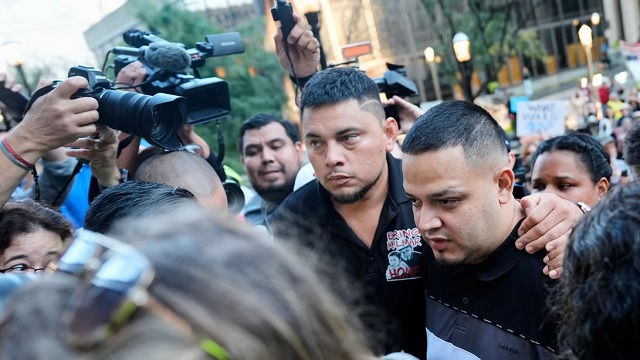
The United States | THE INDEPENDENT | Kilmar Abrego Garcia, who was mistakenly deported but later returned to the U.S., is gearing up for a new phase in his battle with the Trump administration, now staving off efforts to deport him to Uganda.
An evidentiary hearing is set to be scheduled in coming days, where U.S. District Judge Paula Xinis will weigh whether Abrego Garcia can be sent to the third country, where he has no known ties, despite raising fears of persecution and a willingness to be sent somewhere else.
She was wary Monday of the Trump administration’s moves so far but said it’s not too late for the government to “right the ship.” A Justice Department lawyer objected to her preliminary findings.
Here are three key questions the hearing could answer.
- Does Abrego Garcia have a right to choose where he’s deported?
Abrego Garcia’s lawyers argue that the Trump administration cannot send him to Uganda because he has designated another country as the place he wishes to be sent: Costa Rica.
It became known last week that Costa Rica was on the table as a potential place to send Abrego Garcia, when his lawyers said he was presented with a deal to be removed there if he agreed to plead guilty and serve prison time in his human smuggling case first.
A letter from the Costa Rican government, filed publicly in Abrego Garcia’s criminal case, indicated that the country would accept him as a lawful immigrant and not send him back to El Salvador, his home country that he fled out of fear for his safety.
When he declined to extend his stay in jail, opting to be released Friday, the government changed course and said it planned to send him to Uganda.
But on Saturday, Abrego Garcia signed a document designating Costa Rica as his preferred country of removal, sealed court filings obtained by The Hill sister network DC News Now show.
Federal law dictates that noncitizens may “designate one country to which the alien wants to be removed,” at which point “the Attorney General shall remove the alien to the country the alien so designates.”
There are four exceptions to that rule:
- A noncitizen fails to designate a country promptly
- The designated country’s government doesn’t say whether it will accept the noncitizen, within 30 days of the attorney general’s inquiry
- The designated country declines to accept the noncitizen
- The attorney general decides that removing the noncitizen to the country is “prejudicial to the United States”
The law lists off six other removal options before concluding with “if impracticable, inadvisable, or impossible” to remove the noncitizen to the countries described in the previous clauses, the government may select “another country whose government will accept the alien into that country.”
Xinis expressed an interest in exploring the law further, saying there “may be a violation.”
- What would happen to him in Uganda?
If sent to Uganda, Abrego Garcia says he has reason to fear his safety.
On Saturday, he signed a notice of fear of removal to Uganda, accounting concerns of persecution for his race, nationality and beliefs; “torture by or at the acquiescence” of a public official there; and being sent back to his home country to face the same fate.
Simon Sandoval-Moshenberg, one of Abrego Garcia’s lawyers, told reporters Monday that his reasoning stems both from the “general situation” in the country and the “lack of assurances” that he could live there “at liberty,” without the risk of being quickly re-deported to El Salvador.
Xinis noted that it’s unclear what, if anything, the government will say about the protections Uganda has offered Abrego Garcia through the United States.
“The silence is taken certainly in contrast to what’s been provided by the country of Costa Rica,” Xinis said. “The contrast is significant.”
By signing the notice, Abrego Garcia is entitled to a reasonable fear interview, Sandoval-Moshenberg said.
“To me, it seems very clear — crystal clear — that while we’re waiting for that interview to be scheduled, while we’re waiting for the results of that interview, they can’t put him on a plane,” he said.
- What went down with the plea deal in his criminal case?
Xinis also raised the plea deal initially offered to Abrego Garcia in his criminal case as cause for concern.
Abrego Garcia’s lawyers said the offer came in Thursday night, on the eve of his release. It would be “off the table forever” by Monday, when he reported to Immigration and Customs Enforcement in Baltimore, they said.
They’ve framed the deal as an attempt to coerce Abrego Garcia into a guilty plea so he could be deported to his country of choice.
The Justice Department has not had a chance to respond in court filings in this case. But in the criminal case, it rejected the notion that the plea negotiations were anything nefarious.
Prosecutors said in court filings they had been engaged in plea negotiations since July, as is common in criminal cases. They called Abrego Garcia’s lawyers’ allegations “misleading” and suggested it left the court with a “misimpression of the true facts.”
But, at least until the hearing, Xinis said she had made up her mind on the matter.
She said Monday that, at least preliminarily, a showing has been made that the Justice Department conditioned Abrego Garcia’s country of removal on whether he accepted the deal – and because he exercised his constitutional right to a trial, he’d be sent to Uganda instead of Costa Rica.
“You can’t condition the relinquishing of a constitutional right in that regard,” she said.
*****
SOURCE: The Gavel, The Hill’s weekly courts newsletter
 The Independent Uganda: You get the Truth we Pay the Price
The Independent Uganda: You get the Truth we Pay the Price





